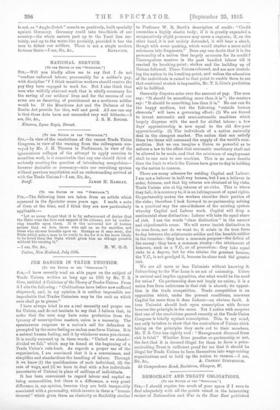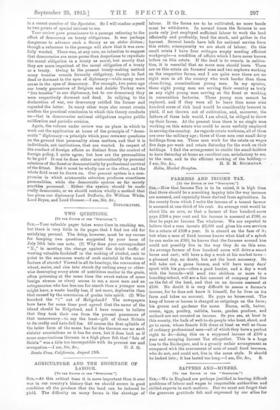DEMOCRACY AND TREATY OBLIGATIONS.
[To THE EDITOR Or TRH ”SrDCTATOR.".1 Sur,—I should. require too much of your space if I were to deal adequately with all the points raised in the interesting review of Nationalism and.. War in the Near East published in a recent number of the Spectator. So I will confine myself to two points of special interest to me.
Your review gave prominence to a passage referring to the effect of democracy on treaty obligations. It was perhaps dangerous to advance such a. theory as an obiter dictum; though a reference to the passage will show that it was care- fully worded. There was, at any rate, no intention to suggest that democracies are more prone than despotisms to repudiate the moral obligation in a treaty as moral, but merely that they are more impatient of the moral obligation of a treaty as a treaty. Owing to the present treaty-making method many treaties remain formally obligatory, though in fact dead or dormant in the eyes of diplomacy—while many more are so in the eyes of democracy. For example, two years ago our treaty guarantees of Belgium and Asiatic Turkey were "live treaties" to our diplomacy, but to our democracy they were respectively dormant and dead. In rallying to the declaration of war, our democracy ratified the former and repealed the latter. In many other ways also recent events confirm the practical conclusion to which this theory conducts us—that in democracies national obligations require public, ratification and periodic revision.
Again, the volume under review was no place in which to work out the application at home of the principle of " demo- cratic:" diplomacy—a principle which your reviewer questions on the ground that personality alone matters, and that it is individuals, not institutions, that are wanted. In respect of the conduct of foreign affairs as distinct from the control of foreign policy, I quite agree; but how are the personalities to be got P It can be done either aristocratically by personal selection of the finest or democratically by professional survival of the fittest. But it must be wholly one or the other, and the whole field must be drawn on. Our present system is a com- promise in which aristocratic selection produces sometimes personalities, while the democratic system so far merely provides personnel. Either the system should be made really democratic, or we should restore wholly a method that has given our diplomacy Lord Dufferin, Sir William White, Lord Bryce, and Lord Cromer.—I am, Sir, Sm.,
DIPLOMATIST.



































 Previous page
Previous page